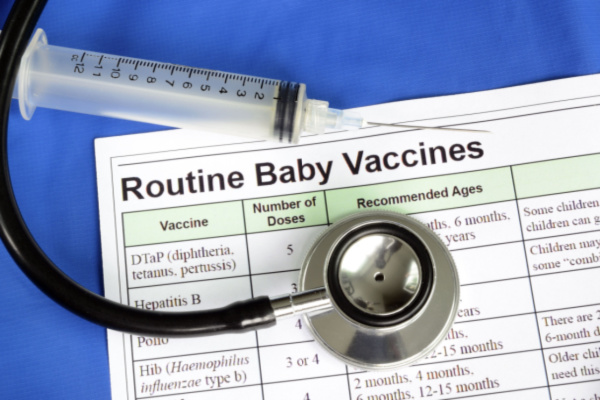National Infant Immunization Week is a yearly observance, highlighting the importance of protecting children two years and younger from vaccine-preventable diseases. This year, NIIW is from April 22 – 29. During this time, and throughout the year, the Center for Disease Control and Prevention, the American Academy of Pediatrics (AAP), and Indian Health Service recommend that children stay on track with their well-child appointments and routine vaccinations.
NIIW is also a time to appreciate and celebrate the achievements immunization programs have had in promoting good health. Supported by the Center for Disease Control and Prevention (CDC), the first National Infant Immunization Week took place in 1994.
With preventable diseases like measles on the rise both globally and in the U.S., the opportunity to celebrate the power of preventing such illnesses through vaccination is timely. On-time vaccination is critical towards providing protection against potentially life-threatening diseases.
This year’s theme focuses on “You have the power to protect. Your recommendation matters.” It is recognition of the trust that parents have of their health care provider’s recommendation for vaccination. By parents, elders, and providers engaging in vaccination conversations, and parents deciding to vaccinate, children are protected against potentially serious diseases like flu, pertussis, and hepatitis B.
Parents often have questions about the vaccines recommended for their children. This is a normal part of the health care engagement process. Questions should be welcomed! Health care providers, elders, and other community members can prepare for commonly asked questions by reading information on trusted websites.
The trust that parents and caregivers have in vaccines is built through the countless conversations they have with health care providers, clinic staff, and other trusted sources. Because of these conversations, the majority of parents choose the safe, proven protections of vaccines. National Infant Immunization Week provides an opportunity to encourage vaccine conversations at all community levels.
Infant immunization protects people from vaccine-preventable diseases throughout their entire lifetime. Although aspects of the campaign may differ each year, the message behind this week is always, ‘Love Them. Protect Them. Immunize Them’ and parents are encouraged or reminded to have their children immunized by the age of 2.
A course of vaccines offers protection against these 14 diseases:
Hepatitis A a contagious disease in which the liver is infected; caused by the Hepatitis A virus.
Hepatitis B a disease of the liver caused by the Hep B virus. In some cases, Hep B remains in the liver for life and can lead to further complications including liver cancer.
Diphtheria – a potentially fatal condition in which the airways can become blocked, restricting breathing. Also associated with heart problems and paralysis of throat muscles needed for swallowing.
Hib Disease (Haemophilus influenzae type b) – a serious disease which can cause meningitis and pneumonia.
Pertussis (whooping cough) key symptoms are persistent violent coughing and choking which can last for weeks.
Pneumococcal Disease a potentially fatal bacterial infection which can cause pneumonia.
Polio a viral infection with possible symptoms of fever, pain, sore throat, head ache and in some cases paralysis and death.
Influenza (flu) more commonly known as the flu, influenza can often cause severe symptoms in infants.
Measles a very contagious disease caused by a virus whose symptoms include cough, fever and rash. In severe cases, measles can cause brain damage, pneumonia, seizures and can also be fatal.
Mumps another contagious condition caused by a virus. Symptoms include headaches, fever, pain and swelling in the salivary glands.
Rotavirus – key symptoms are diarrhea and vomiting which usually last between 3 to 8 days. Other possible symptoms are abdominal pain and fever.
Rubella (German Measles) a virus with key symptoms of fever, rash and swollen glands which last for about 3 days. Severe complications can arise if a pregnant woman has rubella. A pregnant woman with rubella is at greater risk of miscarriage and her baby may have physical defects including loss of sight or hearing and heart problems.
Tetanus also known as ‘lockjaw’, tetanus is a condition which affects the muscles, causing them to spasm. A person may experience headaches, an elevated body temperature and muscle pain. The jaw muscles may spasm causing the jaw to ‘lock’. Tetanus is caused by bacteria in the environment infecting the body through a cut or a wound. For example, tetanus could be caught by a rusty nail penetrating the skin or from soil coming into contact with a cut.
Varicella (Chickenpox) – a highly contagious virus whose symptoms include rash and spots which appear on the face and body.
Consequences Of Not Immunizing Infants
If infants are not immunized the consequences can be severe. Disease often brings economic and social costs, misspent time and resources visiting doctors, hospitalizations and poor child and educational development. These consequences are in addition to any of the direct physical symptoms and problems associated with a given condition. Also in some cases a disease can be fatal.
The CDC encourages individuals, health care providers and relevant organizations to help campaign on their behalf and provide help and resources for those wishing to hold their own NIIW awareness events. This includes advice on planning activities and events, promotional materials including media tools, print products, event signage, Web & E-tools.
A relatively new feature of National Immunization Week is the CDC Childhood Immunization Champion Award. This award is given to individuals in recognition of work which has made a significantly contribution to the immunization program. In the United States, a person in each state in the US is designated a CDC Immunization Champion, with a total of 50 champions each year for each state.
Throughout April, vaccination weeks are also held in other countries, often in collaboration with the World Health Organization (WHO). For example, Afghanistan, China and Columbia hold an immunization week during this month.
For more information about National Infant Immunization Week please visit the official NIIW website.
—
Photo Credit: JohnKwan / Shutterstock.com
